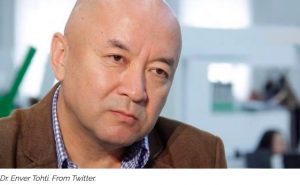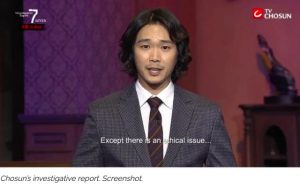Protest against Uyghur organ harvesting in Sydney, Australia. From Twitter.
International moves to ban Chinese organ harvesting take positive steps forward with the passing of a U.S. bill.
Uyghurs have hailed the “Stop Forced Organ Harvesting Act” passed in the US House of Representatives, welcoming the progress made by the US government in combating China’s trade in organs of political prisoners, Falun Gong practitioners, and their own people.
On the other side of the Atlantic, political ping-ponging by UK lawmakers over new procurement legislation following Brexit has flagged up Uyghur vulnerability to organ harvesting, and the World Medical Association meeting recently in Nairobi singled out China’s treatment of Uyghurs for special mention.
The H.R. 1154 bill, authored by Chris Smith (R-New Jersey), was passed resoundingly by 413-2 votes. The legislation gives the U.S. government the go ahead to take tangible steps against forced organ harvesting in China. It authorizes sanctions against individuals and entities complicit in the practice, including banning the export of organ transplant surgery equipment and a halt to the training of organ transplant surgeons. It will now pass onto the Senate for further deliberation.
The decades-long simmering issue of organ harvesting in China has been brewing since the 1970s with concern over organs sourced from executed prisoners. Following international condemnation and Beijing’s promises to come into line, China vowed to end the practice in 2013, again in 2014, before saying the practice finally ended in 2015. But according to the British Medical Council’s medical ethics committee, the goal posts were simply changed, the practice continued, and the numbers were simply crunched to keep criticism at bay. China continued its billion dollar march towards the largest organ transplant program in the world, with around 90,000 transplants a year and waiting times in days or weeks.
As far back as 1990, Uyghur exile Enver Tohti, then a young surgeon in the capital Urumqi, saw three boys over a six month period with the tell tale U-shaped scar on their bodies, indicating kidney theft. In 1995 he himself had been required to extract the organs from a live death row prisoner and ordered to remember that “nothing had happened that day.”

Aynur, a Uyghur refugee speaking to “Bitter Winter” told how the daughter of a friend had left their village with a group of girls to work in inner China one Summer in the ‘80’s. “They returned six months later,” she recounted, “three of them had large scars on their bodies. They had been told they needed a medical exam to work in the factory, but when they woke up they had no idea what had happened to them.” Only when two later became sick and subsequently died, did scans reveal the loss of their kidneys, she told us. But nothing was ever said about it, she confided.
The matter raised its head again in 2016 when “free physicals for all” required every Uyghur in Xinjiang to submit to iris scans, blood typing, fingerprinting and DNA. Uyghurs and human rights campaigners fear the data haul is being used to match organ demand at home and overseas. Fears were compounded during the so-called “People’s” China Tribunal” in 2019 when observers learned over the course of days of witness testimonies, first hand experiences and expert research, that organs were available on demand, that special fast track human organ lanes had been set aside at Xinjiang’s Kashgar airport, and that Uyghurs were being increasingly targeted.
Particular dangers for Uyghurs were flagged up at the China Tribunal by the producer of South Korean TV Chosun’s Investigative Report 7, who discovered while investigating Korean organ tourism to Tianjin, that Saudi nationals were waiting at the same hospital for their “halal organs,” all expenses paid by their government.

A video produced by Beijing Tongshantang Hospital of Traditional Chinese Medicine described the particular facilities for Arab patients including a mosque on site and halal restaurant. A shortened version was shown on a Uyghur activist Facebook page. The original advertisements were later removed.
The Tribunal concluded, “in China forced organ harvesting from prisoners of conscience has been practiced for a substantial period of time involving a very substantial number of victims.”
Enver Tohti, giving his testimony at the Tribunal spoke of how, following a talk he gave in Taipei on organ harvesting in October 2017, he was approached by a Taiwanese national who told him his brother had visited Tianjin for a new kidney. Worried he might be the cause of a Falun Gong practitioner’s death, he was reassured by the surgeon that “now, all organs are coming from Xinjiang.”
Concerns have been compounded by camp survivor testimonies of full and invasive health checks on arrival, mysterious injections and regular disappearances of healthy inmates who were taken, never to return. Reports of deaths in custody and relatives being denied access to the bodies or permission to conduct a funeral of their loved ones have fueled suspicions.
“Extreme alarm“ was registered in 2021 by independent experts commissioned by the UN who found “credible evidence” that detainees from ethnic, linguistic or religious minorities “may be forcibly subjected to blood tests and organ examinations such as ultrasound and x-rays, without their informed consent; while other prisoners are not required to undergo such examinations.” The results of the examinations are reportedly registered in a database of living organ sources that facilitates organ allocation.
“Forced organ harvesting in China appears to be targeting specific ethnic, linguistic or religious minorities held in detention, often without being explained the reasons for arrest or given arrest warrants, at different locations,” they said. “We are deeply concerned by reports of discriminatory treatment of the prisoners or detainees based on their ethnicity and religion or belief.
Despite Beijing’s denials, Ethan Gutmann’s research since 2006, including most recently his finding of large crematoria beside an Aksu “re-education” camp (Uyghur Tribunal report December 2021), has provided several “smoking guns” giving weight to the evidence.
Applauding the US bill, Rushan Abbas of Campaign for Uyghurs, CFU, said her organisation has long been advocating for an end to forced organ harvesting and people trafficking. “The forced harvesting of organs from Uyghur Muslims and other prisoners of conscience is yet another horrific crime the CCP has perpetrated,” she said.
Speaking to Bitter Winter, Abbas described the Act as a “critical turning point in the fight against the Chinese Communist Party’s abhorrent atrocities towards the Uyghur community.” Uyghurs were easy targets for organ matches, she said adding that “China’s brazen advertisement for ‘halal organs’ to Muslims only adds to the horror of this unimaginable crime. The truth may be too gruesome for some to believe, but it is real, and we must hold those responsible accountable for their actions.”
She urged a swift passage of the bill and its eventual enactment into law.
